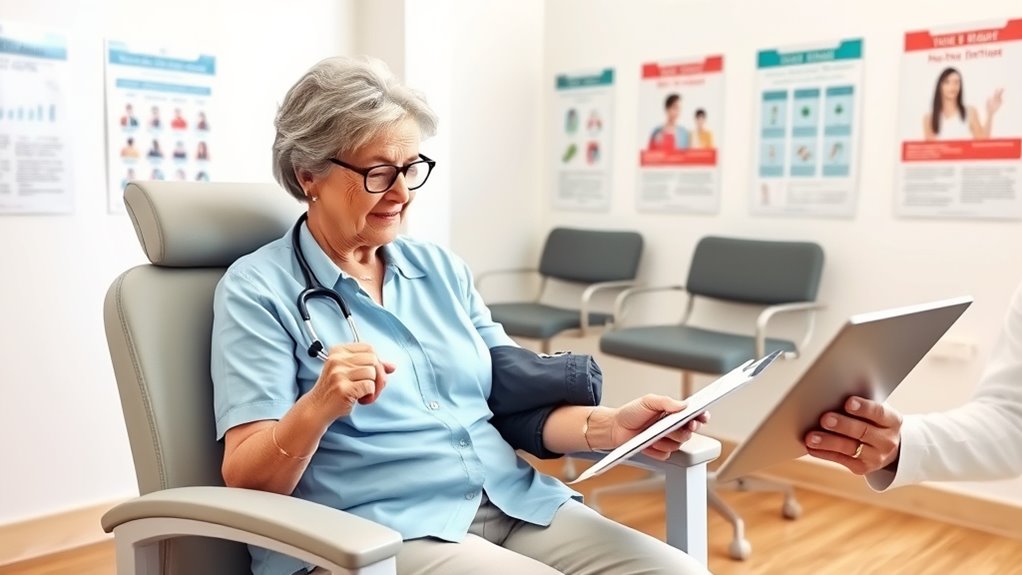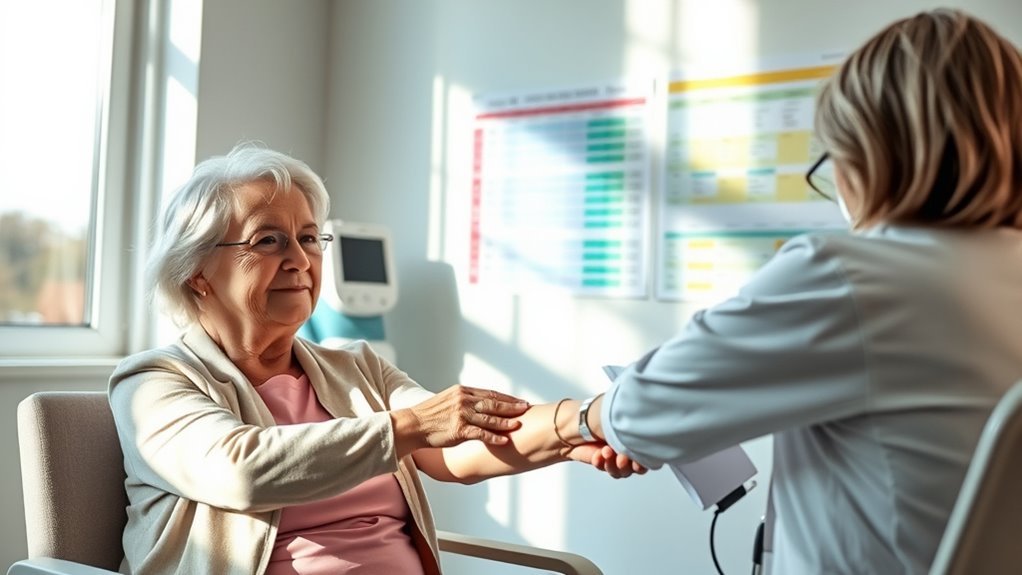To stay healthy as a senior, schedule regular screenings like blood pressure checks, blood tests for cholesterol and blood sugar, and cancer screenings such as mammograms or colonoscopies based on your age and risk factors. Don’t forget vaccinations for flu, shingles, and COVID-19. Mental health check-ins are equally important. Keeping up with these tests helps catch issues early and can improve your quality of life. Learn more about what tests you should prioritize and when to stay ahead of your health.
Key Takeaways
- Schedule regular checkups for blood pressure, cholesterol, blood sugar, and organ function to monitor overall health.
- Undergo age-appropriate cancer screenings such as mammograms, colonoscopies, and prostate exams.
- Get vaccinated annually for flu and periodically for shingles, pneumococcal, and COVID-19 as recommended.
- Perform vision and hearing tests regularly to detect age-related sensory changes early.
- Include mental health screenings and bone density scans to prevent depression and osteoporosis.

Are you aware of the essential health screenings seniors should prioritize? Staying on top of your health is crucial as you age, and regular screenings help catch potential issues early, making treatment more effective. One important aspect often overlooked is mental health. Aging can bring emotional challenges, such as depression or anxiety, which might go unnoticed if you don’t actively monitor your mental well-being. Regular mental health check-ins with your healthcare provider can identify concerns early, enabling you to seek support or therapy before they worsen. Maintaining mental health is just as vital as physical health, and discussing your feelings and stress levels during checkups should be part of your routine.
Prioritize mental health check-ins to identify concerns early and maintain overall well-being as you age
Another key component is keeping your vaccination schedule up to date. Vaccinations help protect against preventable diseases that can be more severe in older adults. Common vaccines recommended for seniors include the flu shot, pneumococcal vaccine, shingles vaccine, and the COVID-19 vaccine. The timing of these shots varies—some are annual, like the flu vaccine, whereas others are administered once or periodically, such as the shingles vaccine. Staying current on vaccines not only shields you from illness but also reduces the risk of complications if you do get sick. Your healthcare provider can help you develop a personalized vaccination schedule based on your health history and lifestyle.
In addition to mental health and vaccinations, other screenings should be part of your health routine. Blood pressure checks are essential since hypertension often has no symptoms but can lead to severe issues like stroke or heart disease if unchecked. Blood tests can monitor cholesterol levels, blood sugar, and organ functions, flagging early signs of diabetes or kidney problems. Cancer screenings, such as mammograms, colonoscopies, and prostate exams, are essential depending on your age and risk factors. Regular eye and hearing tests can catch common age-related issues, ensuring you maintain your quality of life. Bone density scans help detect osteoporosis, preventing fractures and mobility concerns. Moreover, screenings for chronic conditions can aid in managing long-term health challenges more effectively. Incorporating advanced diagnostic tools into routine checkups can further enhance early detection and personalized care. Proactive health management through preventive screenings can significantly reduce the risk of serious complications later on. It is also beneficial to stay informed about emerging health technologies that may offer newer diagnostic options.
The key to effective health management in your senior years is proactive engagement. Schedule regular checkups with your healthcare provider, and don’t hesitate to ask about recommended screenings specific to your age and health history. Staying informed about your health, including mental well-being and vaccination needs, empowers you to take control and live actively. Health screenings for seniors can significantly improve your quality of life by enabling early detection and intervention. Remember, early detection saves lives and improves outcomes, so make these screenings a priority. Your health is your most valuable asset—invest in it wisely by staying vigilant and proactive.
Frequently Asked Questions
How Often Should Seniors Get Blood Pressure Checks?
You should schedule regular blood pressure monitoring, ideally every year or as your doctor recommends, especially if you have risk factors for hypertension. Consistent checks help manage and prevent hypertension complications. If your blood pressure is high or you’re already on medication, more frequent monitoring is necessary. Staying on top of your blood pressure aids in effective hypertension management, keeping your heart healthy and reducing risks of other health issues.
Are There Any Screenings Recommended for Cognitive Health?
You should consider screenings for cognitive health to catch early signs of cognitive decline and support your mental wellness. These tests typically include memory assessments and neurological exams. Regular screening helps identify issues early, allowing for timely intervention. Talk to your healthcare provider about when to start these screenings and how often to repeat them, especially if you notice changes in memory, reasoning, or other mental functions.
What Vaccinations Are Essential for Seniors?
You should follow the immunization schedule recommended for seniors, which includes vaccines like the flu shot, shingles vaccine, and pneumococcal vaccines. These protect you from serious illnesses. Be aware of potential vaccine side effects, which are usually mild but can include soreness or fever. Talk to your healthcare provider to guarantee you’re up-to-date and to discuss any concerns about side effects or timing.
When Should Seniors Start Osteoporosis Screening?
Think of your bones as the foundation of a house—you want it solid and strong. If you have an osteoporosis risk, you should start bone density tests around age 65, or earlier if you have risk factors like family history or lifestyle concerns. These tests help catch weak bones early, so you can take steps to reinforce your foundation and prevent fractures down the line.
Are There Screenings for Early Detection of Diabetes?
You should consider screenings for early detection of diabetes if you have risk factors like obesity, family history, or high blood pressure. Blood sugar testing is a key method used to identify diabetes early. These tests can include fasting blood sugar, oral glucose tolerance, or A1C tests. Regular screening helps catch diabetes in its early stages, allowing you to manage it effectively and prevent complications.
Conclusion
Now that you know which screenings are essential, the real question is—are you scheduling them at the right times? Missing a vital test could mean overlooking early signs of serious health issues. Don’t wait until symptoms appear; prevention is your best defense. Stay proactive, stay informed, and keep your health in check. The next step could make all the difference—are you ready to take it? Your health’s future might depend on it.









